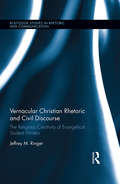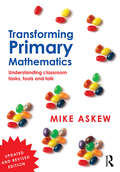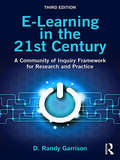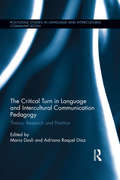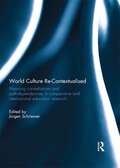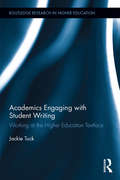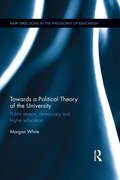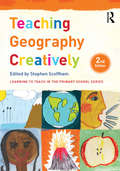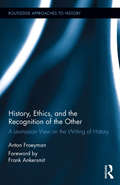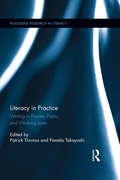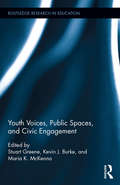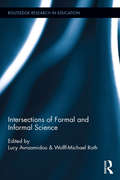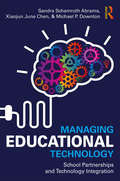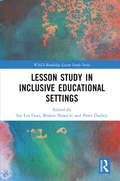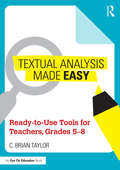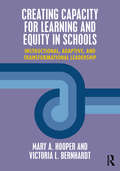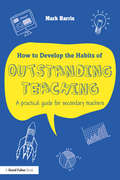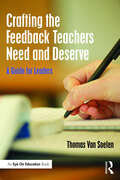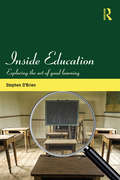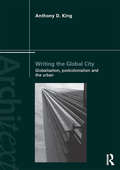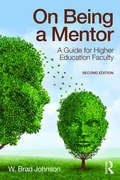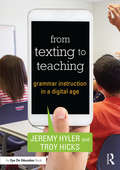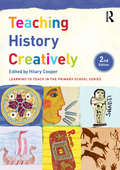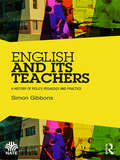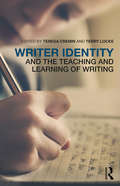- Table View
- List View
Vernacular Christian Rhetoric and Civil Discourse: The Religious Creativity of Evangelical Student Writers (Routledge Studies in Rhetoric and Communication)
by Jeffrey M. RingerVernacular Christian Rhetoric and Civil Discourse seeks to address the current gap in American public discourse between secular liberals and religiously committed citizens by focusing on the academic and public writing of millennial evangelical Christian students. Analysis of such writing reveals that the evangelical Christian faith of contemporary college students—and the rhetorical practice motivated by it—is marked by an openness to social context and pluralism that offers possibilities for civil discourse. Based on case studies of evangelical Christian student writers, contextualized within nationally-representative trends as reported by the National Study of Youth and Religion, and grounded in scholarship from rhetorical theory, composition studies, folklore studies, and sociology of religion, this book offers rhetorical educators a new terministic screen that reveals the complex processes at work within our students’ vernacular constructions of religious faith.
Transforming Primary Mathematics: Understanding classroom tasks, tools and talk
by Mike AskewFully updated to reflect the new curriculum, the revised edition of Transforming Primary Mathematics sets out key theories and cutting-edge research in the field to enable teachers to take a fresh look at how they teach mathematics. The book encourages teachers to reflect on their own beliefs and values about mathematics, and asks them to question whether their current methods meet the needs of all learners, and the challenge of having high expectations for all. It provides clear, practical approaches to help implement fundamental change in classroom environments, and offers motivational teaching styles to ensure meaningful mathematics learning. Chapters take an inspiring, sometimes controversial, and often unconventional look at the subject of mathematics, by: endorsing the use of a 'new mathematics' - one based on problem solving, modelling, inquiry and reasoning, not on abstract rules, memorising, and regurgitation arguing that there is more to maths teaching than 'death by a thousand worksheets' challenging norms, such as the practice of sorting children into sets based on their perceived mathematical ability asking whether mathematical ability is innate or a result of social practices examining what a 'mastery' approach might entail highlighting the role of variation in supporting learning advocating an environment where teachers are encouraged to take risks. Transforming Primary Mathematics is for all primary school teachers who want to make mathematics welcoming, engaging, inclusive and successful.
E-Learning in the 21st Century: A Community of Inquiry Framework for Research and Practice
by D. Randy GarrisonThe third edition of E-Learning in the 21st Century provides a coherent, comprehensive, and empirically-based framework for understanding e-learning in higher education. Garrison draws on his decades of experience and extensive research in the field to explore technological, pedagogical, and organizational implications. The third edition has been fully updated throughout and includes new material on learning technologies, MOOCs, blended learning, leadership, and the importance and role of social connections in thinking and learning, highlighting the transformative and disruptive impact that e-learning has recently had on education.
The Critical Turn in Language and Intercultural Communication Pedagogy: Theory, Research and Practice (Routledge Studies in Language and Intercultural Communication)
by Adriana Raquel Díaz Maria DasliThis edited research volume explores the development of what can be described as the ‘critical turn’ in intercultural communication pedagogy, with a particular focus on modern/foreign language education. The main aim is to trace the realisations of this critical turn against a background of unequal power relations, and to illuminate the role that radical culture educators can play in the making of a more democratic and egalitarian social order. The volume takes as a starting point the idea that criticality draws on a number of intellectual traditions, which do not always focus on social and political critique, and argues that because ideological hegemony impacts on the meanings that people create and share, intercultural communication pedagogy ought to locate itself within wider socio-political contexts. With reference points drawn from critical and transnational social theory, critical pedagogy and intercultural theory, contributors to this volume provide readers with powerful ways that show how this can be achieved, and together assess the impact that their understanding of criticality can make on modern/foreign language education. The volume is divided into three major parts, namely: ‘theorising critically’, ‘researching critically’ and ‘teaching critically’.
World Culture Re-Contextualised: Meaning Constellations and Path-Dependencies in Comparative and International Education Research
by Jürgen SchriewerImpressive strands of research have shown the emergent reality of increasing world-level interconnection in almost every field of social action. As a consequence, theories and models have been developed which are aimed at conceptualising this new reality along the lines of an ‘institutionalised’ World Culture. This offers a new understanding of the worldwide diffusion of specifically modern – i.e. mainly Western – rules, ideologies and organisational patterns, and of attendant harmonisation and standardisation of fields of social action. World Culture theories have not gone unchallenged. Rather, cross-cultural studies have revealed much more complex processes of regional fragmentation and (re-)diversification; of the refraction, appropriation, and hybridisation, through distinct socio-cultural conditioning, of world-level models and ideas; and of the ongoing effectiveness both of structural path-dependencies and of specifically cultural aspects such as collective memories, social meanings, and religious (or ideological) belief systems. Comparative research has thus highlighted an intricate simultaneity of contrary currents: of the increasing world-level interconnection of communication and exchange relations on the one hand, and, on the other, the persistence of context-specific interpretations, translations, and deviation-generating re-contextualisations of world-level forces and challenges.This research provides the theoretical problematique that animates this volume. The chapters explore the conceptual tools and explanatory power of theories and models which do not just oppose or reject World Culture theory, but are instead suited to complementing and differentiating it. The volume offers an enlightening conceptualisation of the intricate interaction of global processes with local agency, and of world-level forces with the self-evolutionary potentials inherent in specific contexts, socio-cultural structures, and distinctive meanings constellations. This book was originally published as a special issue of Comparative Education.
Academics Engaging with Student Writing: Working at the Higher Education Textface (Routledge Research in Higher Education)
by Jackie TuckStudent writing has long been viewed as a problem in higher education in the UK. Moreover, the sector has consistently performed poorly in the National Student Survey with regard to assessment and feedback. Academics Engaging with Student Writing tackles these major issues from a new and unique angle, exploring the real-life experiences of academic teachers from different institutions as they set, support, read, respond to and assess assignments undertaken by undergraduate students. Incorporating evidence from post-1992 universities, Oxbridge, members of the Russell Group and others, this book examines working practices around student writing within the context of an increasingly market-oriented mass higher education system. Presenting a wealth of relevant examples from disciplines as diverse as History and Sports Science, Tuck makes extensive use of interviews, observations, texts and audio recordings in order to explore the perspectives of academic teachers who work with student writers and their texts. This book will be of interest to researchers, academics and postgraduate students in the fields of academic literacies, higher education, language and literacy, language in higher education, English for academic purposes and assessment. Furthermore, academic teachers with experience of this crucial aspect of academic labour will welcome Tuck’s pioneering work as an indispensable tool for making sense of their own engagement with student writers.
Towards a Political Theory of the University: Public reason, democracy and higher education (New Directions in the Philosophy of Education)
by Morgan WhiteTowards a Political Theory of the University argues that state and market forces threaten to diminish the legitimacy, authority and fundamental purposes of higher education systems. The political role of higher education has been insufficiently addressed by academics in recent decades. By applying Habermas’ theory of communicative action, this book seeks to reconnect educational and political theory and provide an analysis of the university which complements the recent focus on the intersections between political philosophy and legal theory. In this book, White argues that there is considerable overlap between crises in democracy and in universities. Yet while crises in democracy are often attributed to the inability of political institutions to adapt to the pace of social and cultural change, this diagnosis wilfully ignores the effects of privatisation on public institutions. Under present political conditions, the university is regarded in instrumental and economic terms, which not only diminishes its functions of developing and sustaining culture but also removes its democratic capabilities. This book explores these issues in depth and presents some of the practical problems associated with turning an independent higher education system into a state-dominated and then, subsequently, marketised system. This book bridges political and educational theory in an original and comprehensive way and makes an important contribution to the debate over the role of the university in a democracy. As such, it will appeal to researchers, academics and postgraduate students in the fields of the philosophy of education, higher education, and political and educational theory. With its implications for policy and practice, it will also be of interest to policy makers.
Teaching Geography Creatively (Learning to Teach in the Primary School Series)
by Stephen ScoffhamTeaching Geography Creatively was Winner of the Geographical Association Gold Award 2014 and Winner of the Geographical Association Silver Award 2017. This fully updated second edition of Teaching Geography Creatively is a stimulating source of guidance for busy trainee and experienced teachers. Packed full of practical approaches for bringing the teaching of geography to life, it offers a range of innovative ideas for exploring physical geography, human geography and environmental issues. Underpinned by the very latest research and theory, expert authors from schools and universities explore the inter-relationship between creativity and learning, and consider how creativity can enhance pupils’ motivation, self-image and well-being. Two brand new chapters focus on creative approaches to learning about the physical world, as well as the value of alternative learning settings. Further imaginative ideas include: games and starter activities as entry points for creative learning how to keep geography messy the outdoors and learning beyond the classroom how to teach geography using your local area the links between geography and other areas of the curriculum looking at geography, creativity and the future fun and games in geography engaging with the world through picture-books teaching about sustainability. With contemporary, cutting-edge practice at the forefront, Teaching Geography Creatively is an essential read for all trainee and practicing teachers, offering a variety of practical strategies to create a fun and stimulating learning environment. In the process it offers a pedagogy that respects the integrity of children as joyful and imaginative learners and which offers a vision of how geography can contribute to constructing a better and more equitable world.
History, Ethics, and the Recognition of the Other: A Levinasian View on the Writing of History (Routledge Approaches to History #17)
by Anton FroeymanThis book introduces a new way of looking at the writing of history. Rather than as the production of knowledge or the telling of stories, it sees writing history as an ethical, existential and emotional engagement with the people from the past. The conceptual and philosophical basis for this view is provided by the philosophy of Emmanuel Levinas. In the first part, the view is presented and contrasted with other, competing views, such as those of Hans-Georg Gadamer and Michel Foucault. In the second part, the view is argued for, most importantly by an in-depth discussion of one specific tradition of history-writing (microhistory), and a series of close readings of several classical works from the history of historiography. The third part, finally, explores some of the methodological consequences of this view, and applies it to a non-academic way of dealing with the past, namely historical performance practice in music. The book features a foreword by Frank Ankersmit.
Literacy in Practice: Writing in Private, Public, and Working Lives (Routledge Research in Literacy #7)
by Patrick Thomas Pamela TakayoshiThe rise of New Literacy Studies and the shift from studying reading and writing as a technical process to examining situated literacies--what people do with literacy in particular social situations--has focused attention toward understanding the connections between reading and writing practices and the broader social goals and cultural practices these literacy practices help to shape. This collection brings together situated research studies of literacy across a range of specific contexts, covering everyday, educational, and workplace domains. Its contribution is to provide, through an empirical framework, a larger cumulative understanding of literacy across diverse contexts.
Youth Voices, Public Spaces, and Civic Engagement (Routledge Research in Education #159)
by Stuart Greene Kevin J. Burke Maria K. McKennaThis collection of original research explores ways that educators can create participatory spaces that foster civic engagement, critical thinking, and authentic literacy practices for adolescent youth in urban contexts. Casting youth as vital social actors, contributors shed light on the ways in which urban youth develop a clearer sense of agency within the structural forces of racial segregation and economic development that would otherwise marginalize and silence their voices and begin to see familiar spaces with reimagined possibilities for socially just educational practices.
Intersections of Formal and Informal Science (Routledge Research in Education #165)
by Wolff-Michael Roth Lucy AvraamidouScience learning that takes place between and at the intersections of formal and informal science environments has not been systematically reviewed to offer a comprehensive understanding of the existing knowledge base. Bringing together theory and research, this volume describes the various ways in which learning science in various settings has been conceptualized as well as empirical evidence to illustrate how science learning in these settings can be supported.
Managing Educational Technology: School Partnerships and Technology Integration
by Sandra Schamroth Abrams Xiaojun June Chen Michael P. DowntonManaging Educational Technology: School Partnerships and Technology Integration by Sandra Schamroth Abrams, Xiaojun June Chen, and Michael P. Downton. Sandra Schamroth Abrams is an associate professor in the Department of Curriculum and Instruction at St. John’s University, USA. Xiaojun Chen is an associate professor of educational technologies in the Department of Curriculum and Instruction at St. John’s University, USA. Michael P. Downton is an assistant professor in the Department of Curriculum and Instruction at St. John’s University, USA.
Lesson Study in Inclusive Educational Settings (WALS-Routledge Lesson Study Series)
by Sui Lin GoeiLesson Study has been shown to be a systematic way of building teachers’ knowledge by allowing them to share their knowledge with each other. While much has been written about the benefits of Lesson Study in science and mathematics education, this book analyses its impact on education for children with special needs. It studies the ways in which the Lesson Study process is implemented in different educational contexts in the Netherlands, Singapore, the UK, and Sweden—countries which propagate more inclusive learning environments regardless of varying degrees of student capacities. In addition to making transcultural comparisons regarding concepts, procedures, and instruments in the use of Lesson Study in these four countries, this book will provide practice-based suggestions for teachers to formulate collaborative lesson plans.
Textual Analysis Made Easy: Ready-to-Use Tools for Teachers, Grades 5-8
by C. Brian TaylorIn this new book, you’ll learn how to teach evidence-based writing using a variety of tools, activities, and sample literary texts. Showing elementary and middle school students how to think critically about what they’re reading can be a challenge, but author C. Brian Taylor makes it easy by presenting twelve critical thinking tools along with step-by-step instructions for implementing each one effectively in the classroom. You’ll learn how to: Design units and lesson plans that gradually introduce your students to more complex levels of textual analysis; Encourage students to dig deeper by using the 12 Tools for Critical Thinking; Help students identify context and analyze quotes with the Evidence Finder graphic organizer; Use the Secret Recipe strategy to construct persuasive evidence-based responses that analyze a text’s content or technique; Create Cue Cards to teach students how to recognize and define common literary devices. The book also offers a series of extra examples using mentor texts, so you can clearly see how the strategies in this book can be applied to excerpts from popular, canonical, and semi-historical literature. Additionally, a number of the tools and templates in the book are available as free eResources from our website (http://www.routledge.com/9781138950658), so you can start using them immediately in your classroom.
Creating Capacity for Learning and Equity in Schools: Instructional, Adaptive, and Transformational Leadership
by Victoria L. Bernhardt Mary A. HooperSuccessful educational leaders develop people, processes, culture, and structures in their schools. Creating Capacity for Learning and Equity in Schools provides a comprehensive guide for aspiring and practicing leaders to strengthen their capacity to create high levels of learning and equity. Chapters explore key theories and research, provide resources for developing personal and organizational leadership capacity, and guide leaders through a reflective process to help them link theory and practice. Hooper and Bernhardt's model for excellence and equity provides a pathway for educators to create and sustain learning communities in schools. Exploring three leadership approaches--Instructional, Adaptive, and Transformational--this textbook prepares and develops leaders to engage school communities through effective instructional leadership, data-informed decision-making, and a vision for learning and equity for all. Special Features: Theory to Practice (T2P) Framework--A series of structured exercises help readers review and reflect on existing organizational practices and develop new action plans. Case Studies--Encourage individual reflection and collective discussion on key leadership scenarios. Examples in Action--Challenge readers to analyze new connections and leadership processes. A companion website--Includes additional resources and tools for instructors to facilitate activities in the classroom.
How to Develop the Habits of Outstanding Teaching: A practical guide for secondary teachers
by Mark HarrisThere can arguably be no greater influence on a person’s life than their education, and it is the classroom practice of teachers that helps to shape young lives. How to Develop the Habits of Outstanding Teaching aims to help teachers improve their teaching habits and practice so that every student can be supported, challenged and inspired to achieve their ambitions and goals. Providing a step-by-step guide to the key components for creating outstanding lessons, the book includes a wealth of strategies and techniques that are easy to implement and will have an immediate impact on your teaching and students. With a wide range of examples and case studies taken from different subjects, the book covers all aspects of teaching including: how to create independence, resilience and creativity; tried and test techniques for differentiation and questioning; habits and hacks to manage your time effectively; ideas on how you can coach yourself to ‘outstanding’; Memory techniques for students; literacy in lessons; marking and homework. Ideal for newly qualified teachers, as well as more experienced teachers who are looking for some fresh ideas for their lessons, this highly practical resource will instil the habits that will enable you to perform at an outstanding level consistently in the classroom.
Crafting the Feedback Teachers Need and Deserve: A Guide for Leaders
by Thomas M. Van SoelenCrafting the Feedback Teachers Need and Deserve illuminates an often overlooked aspect of educational leadership: providing quality written feedback. This resource offers context, purpose, and techniques on how to capture and write beneficial feedback. Proven in school districts, Van Soelen’s strategies will accelerate improvement in classroom practice and result in teachers who crave feedback and use it to supervise themselves. Full of examples and complete with an assessment tool to gauge current practice, this book shares insights into providing effective observation and feedback within any teacher evaluation system.
Inside Education: Exploring the art of good learning
by Stephen O'BrienTo learn more about learning – what it is and how it works – it is necessary to look inside education. Inside Education takes the reader on a journey of four ‘live’ education projects: the first all-Irish speaking, mixed-gendered, multi-faith primary school in the Republic of Ireland ideally suited to exploring learning identity; an alternative post-primary school for those who leave (or are left behind by) the formal education system also based in the Republic of Ireland and ideally suited to exploring personal learning; an early college school that enables students to simultaneously sit their high-school diploma and college exams based in Queens, New York and ideally suited to exploring learning success; and an adult education training centre that works with ‘landless’ movement members based in Brazil and ideally suited to exploring learning power. <P><P>Using a critical ethnography approach, each research narrative naturally unfolds/enfolds to tell a more complete learning story. All those interested in education are primed readers. By (re-)viewing their own learning outlook, they may begin to advance deeper critical ideas and debates in education. They may come to (re-)represent education, reminding public consciousness of its human stories, as well as its curious, intricate and powerful qualities. And they may (re-)discover ‘other’ roads to raise a scholar. Teachers, educational researchers, parents and guardians will be particularly interested readers.
Writing the Global City: Globalisation, Postcolonialism and the Urban (Architext)
by Anthony D KingOver the last three decades, our understanding of the city worldwide has been revolutionized by three innovative theoretical concepts – globalisation, postcolonialism and a radically contested notion of modernity. The idea and even the reality of the city has been extended out of the state and nation and re-positioned in the larger global world. In this book Anthony King brings together key essays written over this period, much of it dominated by debates about the world or global city. Challenging assumptions and silences behind these debates, King provides largely ignored historical and cultural dimensions to the understanding of world city formation as well as decline. Interdisciplinary and comparative, the essays address new ways of framing contemporary themes: the imperial and colonial origin of contemporary world and global cities, actually existing postcolonialisms, claims about urban and cultural homogenisation and the role of architecture and built environment in that process. Also addressed are arguments about indigenous and exogenous perspectives, Eurocentricism, ways of framing vernacular architecture, and the global historical sociology of building types. Wide-ranging and accessible, Writing the Global City provides essential historical contexts and theoretical frameworks for understanding contemporary urban and architectural debates. Extensive bibliographies will make it essential for teaching, reference and research.
On Being a Mentor: A Guide for Higher Education Faculty, Second Edition
by W. Brad JohnsonOn Being a Mentor is the definitive guide to the art and science of engaging students and faculty in effective mentoring relationships in all academic disciplines. Written with pithy clarity and rooted in the latest research on developmental relationships in higher educational settings, this essential primer reviews the strategies, guidelines, and best practices for those who want to excel as mentors. Evidence-based advice on the rules of engagement for mentoring, mentor functions, qualities of good mentors, and methods for forming and managing these relationships are provided. Summaries of mentorship relationship phases and guidance for adhering to ethical principles are reviewed along with guidance about mentoring specific populations and those who differ from the mentor in terms of sex and race. Advice about managing problem mentorships, selecting and training mentors, and measuring mentorship outcomes and recommendations for department chairs and deans on how to foster a culture of excellent mentoring in an academic community is provided. Chalk full of illustrative case-vignettes, this book is the ideal training tool for mentoring workshops. Highlights of the new edition include: Introduces a new model for conceptualizing mentoring relationships in the context of the various relationships professors typically develop with students and faculty (ch. 2). Provides guidance for creating a successful mentoring culture and structure within a department or institution (ch. 16). Now includes questions for reflection and discussion and recommended readings at the end of each chapter for those who wish to delve deeper into the content. Best Practices sections highlight the key takeaway messages. The latest research on mentoring in higher education throughout. Part I introduces mentoring in academia and distinguishes mentoring from other types of relationships. The nuts and bolts of good mentoring from the qualities of those who succeed as mentors to the common behaviors of outstanding mentors are the focus of Part II. Guidance in establishing mentorships with students and faculty, the common phases of mentorship, and the ethical principles governing the mentoring enterprise is also provided. Part III addresses the unique issues and answers to successfully mentoring undergraduates, graduate students, and junior faculty members and considers skills required of faculty who mentor across gender and race. Part IV addresses management of dysfunctional mentorships and the documentation of mentorship outcomes. The book concludes with a chapter designed to encourage academic leaders to make high quality mentorship a salient part of the culture in their institutions. Ideal for faculty or career development seminars and teaching and learning centers in colleges and universities, this practical primer is appreciated by professors, department chairs, deans, and graduate students in colleges, universities, and professional schools in all academic fields including the social and behavioral sciences, education, natural sciences, humanities, and business, legal, and medical schools.
From Texting to Teaching: Grammar Instruction in a Digital Age
by Troy Hicks Jeremy HylerDon’t blame technology for poor student grammar; instead, use technology intentionally to reach students and actually improve their writing! In this practical book, bestselling authors Jeremy Hyler and Troy Hicks reveal how digital tools and social media – a natural part of students’ lives – can make grammar instruction more authentic, relevant, and effective in today’s world. Topics Covered: Teaching students to code switch and differentiate between formal and informal sentence styles Using flipped lessons to teach the parts of speech and help students build their own grammar guides Enlivening vocabulary instruction with student-produced video Helping students master capitalization and punctuation in different digital contexts Each chapter contains examples, screenshots, and instructions to help you implement the ideas. With the strategies in this book, you can empower students to become better writers with the tools they already love and use daily. Additional resources and links are available on the book’s companion wiki site: textingtoteaching.wikispaces.com
Teaching History Creatively (Learning To Teach In The Primary School Ser.)
by Hilary CooperThe fully updated second edition of Teaching History Creatively introduces teachers to the wealth of available approaches to historical enquiry, ensuring creative, effective learning. This book clearly sets out the processes of historical enquiry, demonstrating how these are integrally linked with key criteria of creativity and helps readers to employ those features of creativity in the classroom. Underpinned by theory and research, it offers informed and practical support and is illustrated throughout with examples of children’s work. Key themes addressed include: investigating sources using archives in your own research project becoming historical agents and history detectives drama for exploring events myths and legends communicating historical understanding creatively. With brand new chapters from the Stone Ages to the Iron Age, using prehistoric sources; The withdrawal of the Romans and the conquest and settlement of Britain by the Anglo-Saxons, in addition to many new case studies, this exciting edition puts an emphasis on accessible, recent research, new evidence and interpretations and encourages the creative dynamism of the study of history. Teaching History Creatively provides vivid and rich examples of the creative use of sources, of approaches to understanding chronology and concepts of time and of strategies to create interpretations. It is an essential purchase for any teacher or educator who wishes to embed creative approaches to teaching history in their classroom.
English and Its Teachers: A History of Policy, Pedagogy and Practice
by Simon GibbonsEnglish and Its Teachers offers a historical overview of the development of secondary English teaching in schools over the past 50 years. Initially charting the rise of a new progressive approach in the 1960s, the book then considers the implications for the subject and its teachers of three decades of central policy intervention. Throughout, document and interview data are combined to construct a narrative that details the fascinating and, at times, turbulent history. ? The book is divided into two main parts – ‘The age of invention’ and ‘The age of intervention’. The first of these sections details how innovative English teachers and academics helped to develop a new model. The second section explores how successive governments have sought to shape English through policy. A final part draws comparisons with the teaching of the subject in other major English-speaking nations and considers what the future might hold. ? English and Its Teachers is a valuable resource for those interested in the teaching of English in secondary schools, from new entrants to the profession, to experienced teachers and academics working in the sector.
Writer Identity and the Teaching and Learning of Writing
by Teresa Cremin Terry LockeWriter Identity and the Teaching and Learning of Writing is a groundbreaking book which addresses what it really means to identify as a writer in educational contexts and the implications for writing pedagogy. It conceptualises writers’ identities, and draws upon empirical studies to explore their construction, enactment and performance. Focusing largely on teachers’ identities and practices as writers and the writer identities of primary and secondary students, it also encompasses the perspectives of professional writers and highlights promising new directions for research. With four interlinked sections, this book offers: Nuanced understandings of how writer identities are shaped and formed; Insights into how classroom practice changes when teachers position themselves as writers alongside their students; New understandings of what this positioning means for students’ identities as writers and writing pedagogy; and Illuminating case studies mapping young people's writing trajectories. With an international team of contributors, the book offers a global perspective on this vital topic, and makes a new and strongly theorised contribution to the field. Viewing writer identity as fluid and multifaceted, this book is important reading for practising teachers, student teachers, educational researchers and practitioners currently undertaking postgraduate studies. Contributors include: Teresa Cremin, Terry Locke, Sally Baker, Josephine Brady, Diane Collier, Nikolaj Elf, Ian Eyres, Theresa Lillis, Marilyn McKinney, Denise Morgan, Debra Myhill, Mary Ryan, Kristin Stang, Chris Street, Anne Whitney and Rebecca Woodard.
